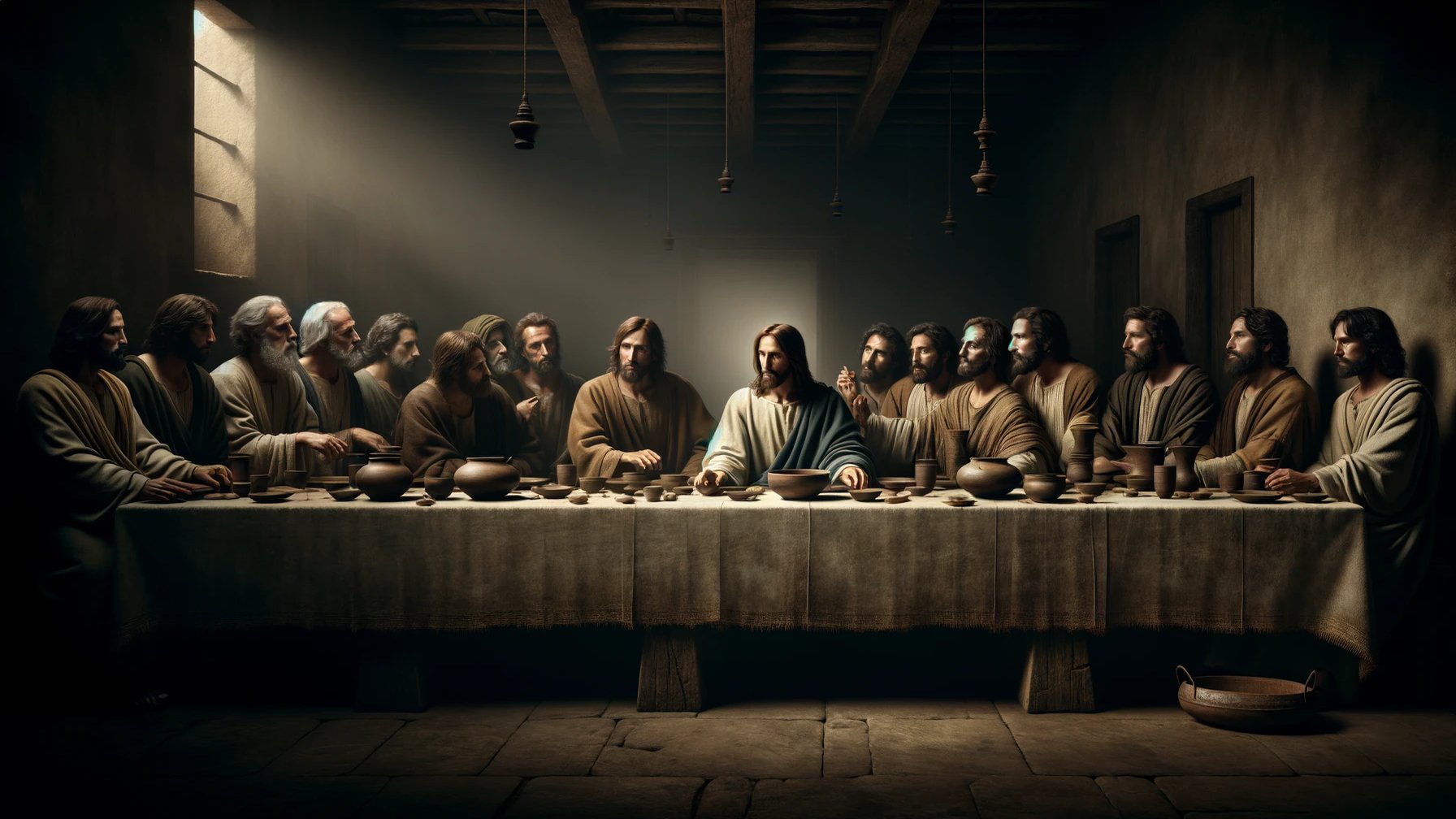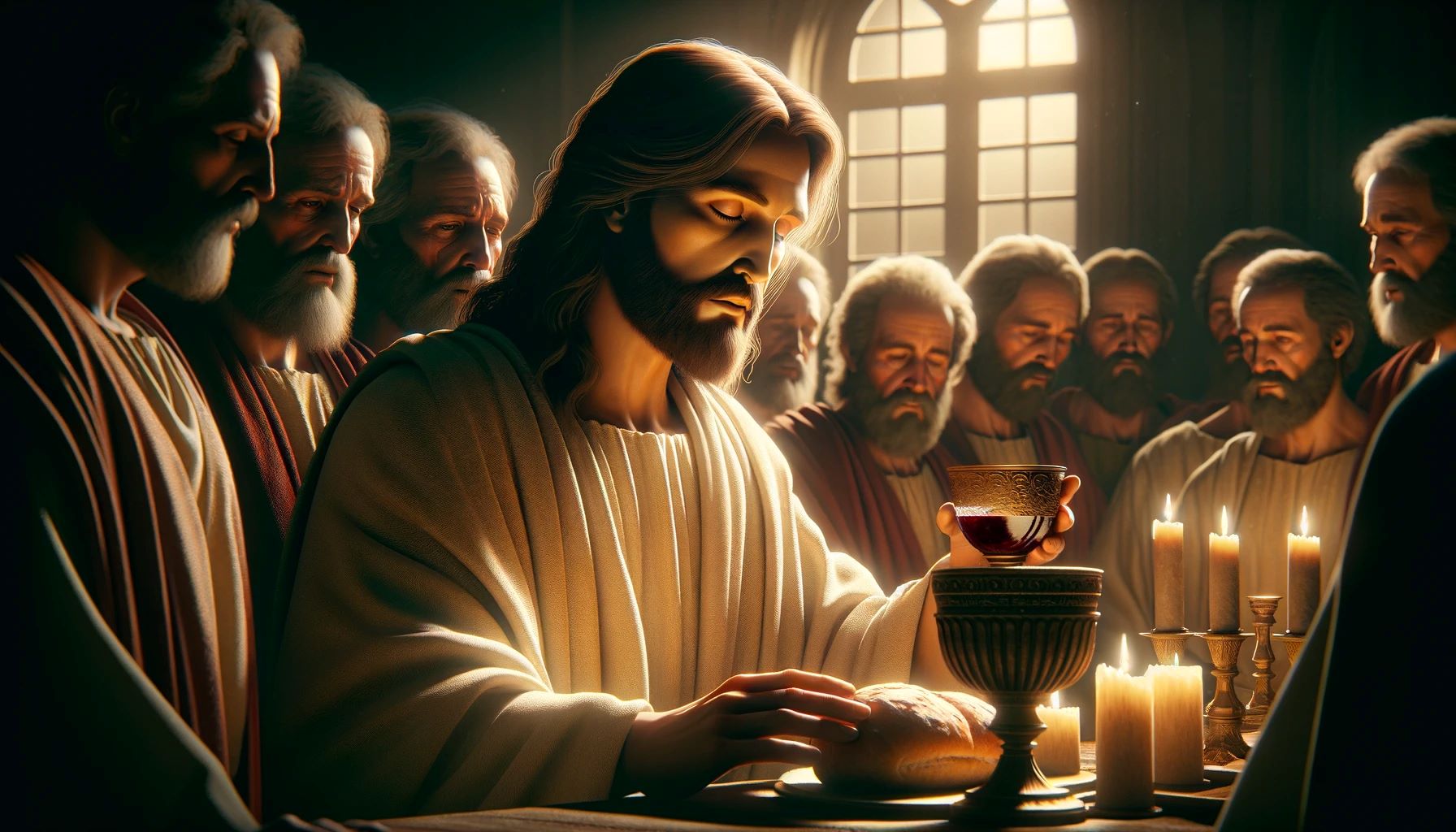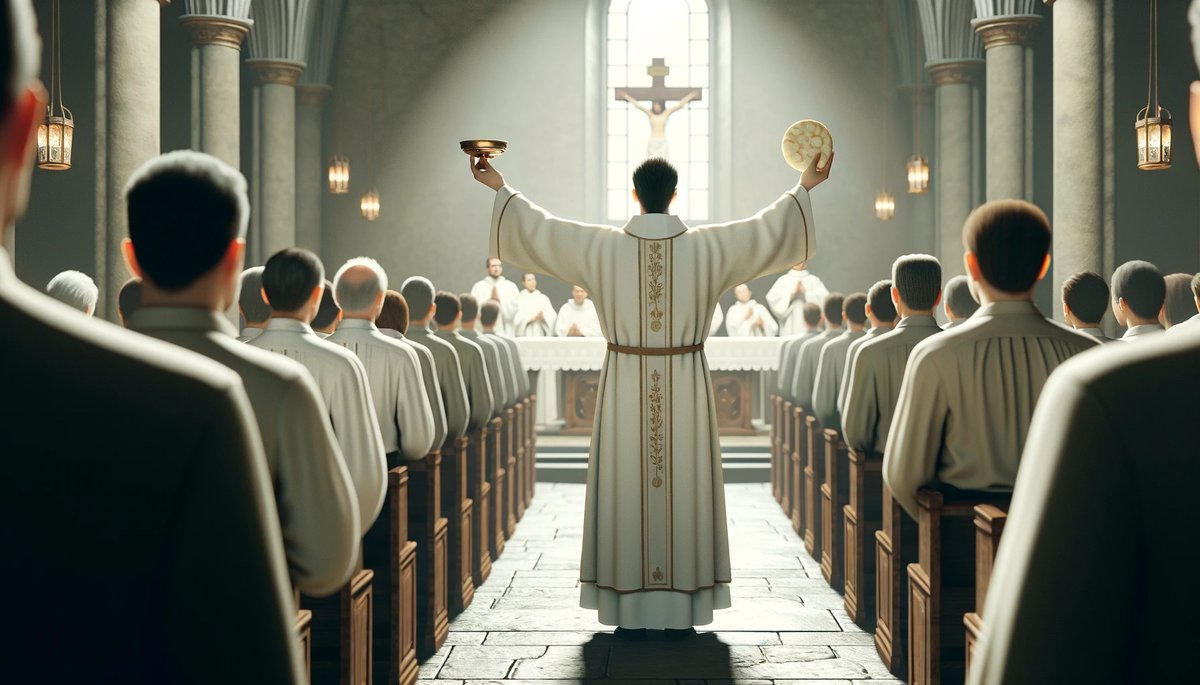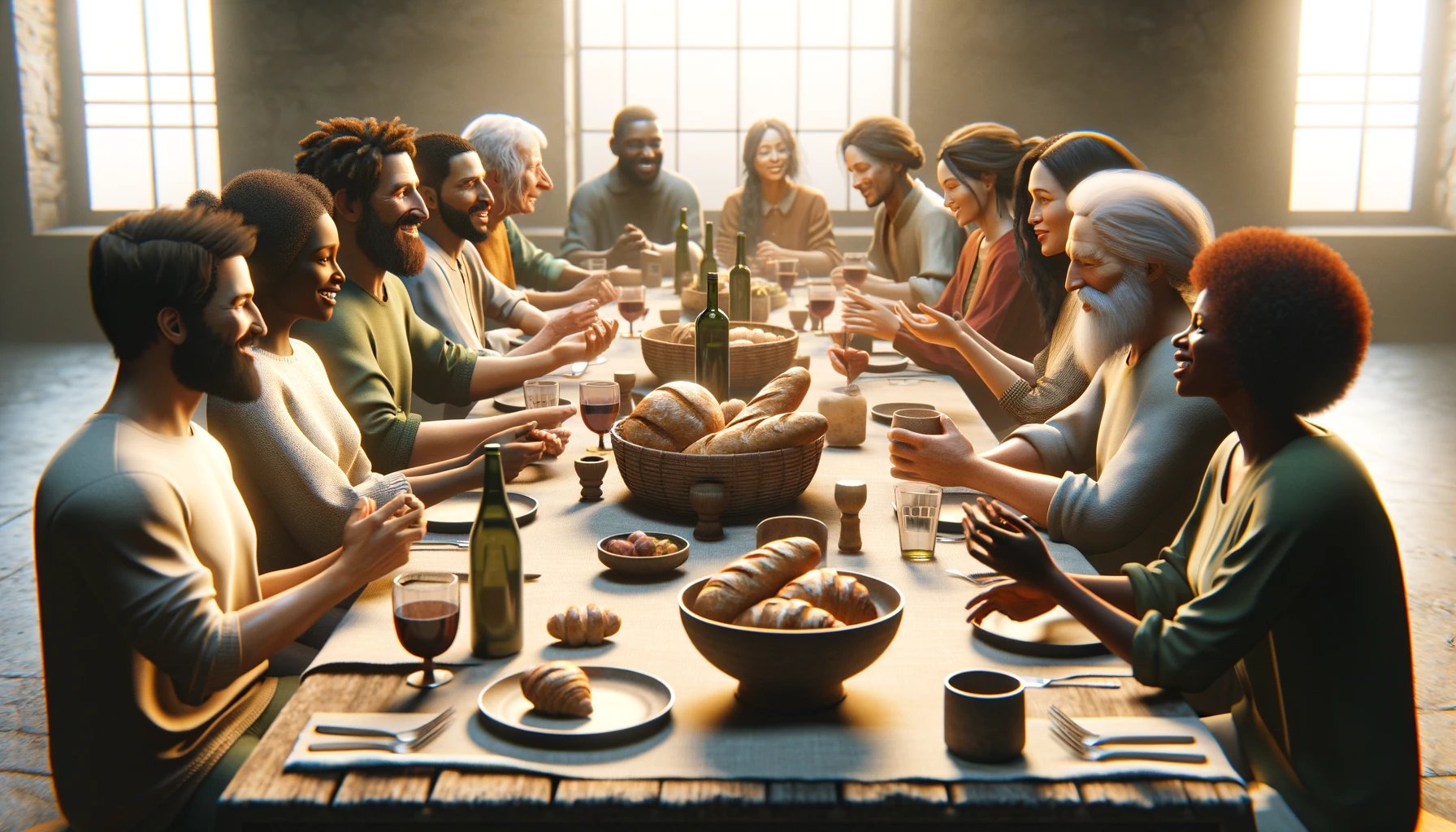Home>Theology and Spirituality>The Last Supper: When Jesus Does Communion


Theology and Spirituality
The Last Supper: When Jesus Does Communion
Published: February 25, 2024
Ericka Andersen, an editor at Christian.net, expertly merges digital strategy with content creation, focusing on faith and societal issues. Her communication skills enhance the platform's engaging narratives, fostering meaningful dialogue on belief's impact on society.
Explore the significance of the Last Supper and Jesus' act of communion in this insightful theology and spirituality discussion. Understand the deeper meaning and relevance of this sacred event.
(Many of the links in this article redirect to a specific reviewed product. Your purchase of these products through affiliate links helps to generate commission for Christian.net, at no extra cost. Learn more)
Table of Contents
Introduction
The Last Supper is a pivotal event in Christian theology, symbolizing the ultimate sacrifice and love of Jesus Christ for humanity. This sacred gathering, which took place on the eve of Jesus' crucifixion, holds profound significance in the Christian faith and has been immortalized in art, literature, and religious practices.
The Last Supper is a poignant and transformative moment in the life of Jesus, as it marks the institution of the Holy Communion, a central sacrament in Christianity. This solemn occasion, captured in the Gospels of Matthew, Mark, and Luke, portrays Jesus sharing a final meal with his disciples before his crucifixion. The atmosphere is charged with emotion and spiritual gravity, as Jesus imparts profound teachings and prepares his followers for the trials that lie ahead.
The events of the Last Supper unfold against the backdrop of ancient Jerusalem, a city steeped in history and religious significance. The gathering takes place in an upper room, where Jesus and his disciples partake in a meal that transcends the boundaries of sustenance, becoming a profound spiritual communion.
The Last Supper encapsulates the essence of selflessness and divine love, as Jesus humbly washes the feet of his disciples, exemplifying servanthood and humility. This act of profound humility and love serves as a powerful testament to the core values of compassion and self-sacrifice that underpin the Christian faith.
The Last Supper serves as a poignant prelude to the crucifixion, as Jesus shares bread and wine with his disciples, imbuing these elements with deep symbolism that reverberates through the annals of Christian history. This transformative act of sharing bread as his body and wine as his blood lays the foundation for the sacrament of Holy Communion, which remains a cornerstone of Christian worship and spiritual nourishment.
The Last Supper stands as a timeless testament to the enduring legacy of Jesus' teachings and the profound impact of his life and ministry. Its significance reverberates through the corridors of time, shaping the spiritual consciousness of countless believers and serving as a poignant reminder of the enduring power of faith, love, and sacrifice.
Read more: What Is The Lord’s Supper Or Communion
The Historical Context of the Last Supper
The Last Supper, a momentous event in Christian theology, unfolded within the rich tapestry of historical and cultural dynamics of ancient Jerusalem. The city, a crucible of religious fervor and political tension, provided the backdrop for this transformative gathering.
During the time of Jesus, Jerusalem was under Roman occupation, and the Jewish population was fervently awaiting the arrival of the Messiah, a figure of deliverance and redemption. Against this charged backdrop, Jesus, regarded by his followers as the long-awaited Messiah, arrived in Jerusalem during the Passover festival, a time of heightened spiritual significance for the Jewish people.
The Last Supper took place in an upper room, a setting that evokes the intimacy and solemnity of the occasion. This location, often interpreted as a guest chamber, underscores the significance of the gathering, as Jesus shared this poignant moment with his closest disciples.
The Passover meal, steeped in tradition and symbolism, provided the framework for the Last Supper. This sacred feast commemorated the Israelites' liberation from slavery in Egypt and held profound spiritual resonance for the Jewish community. Within this context, Jesus infused the traditional elements of the Passover meal with new meaning, imbuing them with profound symbolism that transcended the boundaries of Jewish tradition.
The historical context of the Last Supper is also intertwined with the socio-political landscape of the time. The Roman occupation and the complex web of religious and cultural dynamics set the stage for the events that unfolded during this pivotal gathering. Jesus' teachings and actions during the Last Supper reverberated against the backdrop of societal expectations and religious fervor, challenging existing norms and offering a radical vision of spiritual transformation and redemption.
The historical context of the Last Supper provides a compelling lens through which to understand the profound impact of this event. It underscores the convergence of religious, cultural, and political forces that shaped the narrative of Jesus' life and ministry, illuminating the enduring significance of this sacred gathering within the broader tapestry of human history.
The Last Supper, set against the backdrop of ancient Jerusalem, stands as a testament to the enduring power of faith, love, and sacrifice, resonating across centuries and continuing to inspire and uplift the hearts of believers around the world.
The Significance of the Last Supper in Christianity
The Last Supper holds profound significance in Christianity, serving as a cornerstone of the faith and encapsulating the essence of Jesus' redemptive mission. At the heart of its significance lies the institution of the Holy Communion, a sacred sacrament that embodies the spiritual nourishment and unity of believers across generations.
The Last Supper stands as a poignant testament to Jesus' selfless love and ultimate sacrifice for humanity. As he shared the bread and wine with his disciples, Jesus imbued these elements with deep symbolism, foreshadowing his impending crucifixion and the atoning sacrifice that would form the bedrock of Christian theology. The act of sharing bread as his body and wine as his blood established the profound spiritual significance of the Eucharist, a ritual that continues to be central to Christian worship and communal fellowship.
Furthermore, the Last Supper represents the culmination of Jesus' earthly ministry, as he imparted profound teachings and spiritual guidance to his disciples. His words during this sacred gathering resonate with timeless wisdom and offer a blueprint for Christian living, emphasizing the values of humility, servanthood, and sacrificial love. The act of Jesus washing the feet of his disciples exemplifies the essence of servant leadership and underscores the transformative power of selfless service and compassion.
Moreover, the Last Supper serves as a profound expression of unity and fellowship within the Christian community. Through the sacrament of Holy Communion, believers partake in a spiritual communion with Christ and with one another, transcending temporal boundaries and affirming their shared identity as members of the body of Christ. This sacred ritual fosters a sense of spiritual nourishment, renewal, and interconnectedness, reinforcing the bonds of faith and underscoring the enduring presence of Christ in the midst of his followers.
The significance of the Last Supper reverberates through the annals of Christian history, shaping the liturgical practices, theological reflections, and devotional life of believers. It stands as a poignant reminder of the transformative power of Christ's love and the redemptive hope that permeates the Christian narrative. The Last Supper encapsulates the essence of Christian faith, embodying the profound mystery of Christ's presence and the promise of eternal life, thus affirming its enduring significance as a sacred cornerstone of Christian spirituality.
The Symbolism of Communion in the Last Supper
The Last Supper holds profound significance in Christian theology, particularly in its establishment of the sacrament of Holy Communion. At the heart of this symbolism lies the transformative act of Jesus sharing bread as his body and wine as his blood with his disciples. This profound gesture imbued the elements of the Last Supper with deep spiritual meaning, laying the foundation for the sacred ritual of Communion that continues to be central to Christian worship and spiritual nourishment.
The act of sharing bread and wine during the Last Supper serves as a poignant foreshadowing of Jesus' impending sacrifice on the cross. By imparting new significance to these elements, Jesus established a profound connection between the physical and the spiritual, infusing the bread and wine with the essence of his redemptive mission. The bread, symbolizing his body, and the wine, symbolizing his blood, became tangible expressions of the sacrificial love and atoning grace that form the core of Christian faith.
Furthermore, the symbolism of Communion in the Last Supper extends beyond the commemoration of Jesus' sacrifice. It embodies the concept of spiritual nourishment and unity within the body of Christ. Through the act of partaking in the bread and wine, believers enter into a profound communion with Christ, experiencing his presence in a tangible and transformative manner. This sacred ritual fosters a sense of spiritual sustenance, renewal, and interconnectedness, reinforcing the bonds of faith and affirming the enduring presence of Christ in the midst of his followers.
The symbolism of Communion also underscores the concept of remembrance and anticipation within the Christian faith. As Jesus instructed his disciples to partake in the bread and wine in remembrance of him, he established a timeless ritual that transcends temporal boundaries, inviting believers to participate in the ongoing narrative of redemption and hope. The act of Communion becomes a sacred moment of remembrance, gratitude, and anticipation, as believers reflect on the profound significance of Christ's sacrifice and look forward to the fulfillment of his redemptive promise.
In essence, the symbolism of Communion in the Last Supper encapsulates the transformative power of Christ's love and the enduring significance of his redemptive mission. It serves as a tangible expression of spiritual nourishment, unity, remembrance, and anticipation, embodying the essence of Christian faith and affirming the abiding presence of Christ in the hearts of believers.
The Last Supper in Art and Culture
The Last Supper has left an indelible mark on the artistic and cultural landscape, inspiring a myriad of interpretations, representations, and adaptations across centuries. From iconic paintings to literary works and cinematic depictions, the Last Supper has served as a wellspring of creative inspiration, capturing the imagination of artists, writers, and filmmakers alike.
One of the most renowned artistic renderings of the Last Supper is Leonardo da Vinci's masterpiece, which stands as a testament to the enduring power of this sacred gathering. Painted in the late 15th century, da Vinci's portrayal of the Last Supper has become an iconic symbol of artistic brilliance and spiritual profundity. The composition, with its meticulous attention to detail and emotive portrayal of the disciples' reactions to Jesus' announcement of betrayal, has solidified its place as a timeless masterpiece that continues to captivate and resonate with audiences worldwide.
Beyond the realm of visual art, the Last Supper has permeated the literary sphere, inspiring numerous works of literature that delve into the spiritual, emotional, and psychological dimensions of this sacred event. Authors and poets have drawn upon the Last Supper as a source of contemplation and introspection, weaving its themes of betrayal, redemption, and divine love into the fabric of their narratives. The Last Supper has thus become a recurring motif in literature, serving as a rich tapestry for exploring the complexities of human nature and the transcendent power of faith.
Furthermore, the Last Supper has found resonance in the realm of cinema, with filmmakers harnessing its dramatic and emotional potency to craft compelling narratives that resonate with audiences. Through evocative visual storytelling, directors have brought the Last Supper to life on the silver screen, infusing it with a contemporary relevance that speaks to the universal themes of sacrifice, loyalty, and spiritual awakening. These cinematic interpretations have served to rekindle the timeless allure of the Last Supper, inviting audiences to engage with its profound significance in new and compelling ways.
The enduring presence of the Last Supper in art and culture underscores its timeless relevance and universal appeal. Across diverse artistic mediums, the Last Supper continues to inspire creativity, contemplation, and dialogue, serving as a poignant reminder of the enduring power of faith, love, and sacrifice. Its legacy endures as a testament to the profound impact of Jesus' life and teachings, transcending temporal and cultural boundaries to resonate with the hearts and minds of people around the world.
Conclusion
The Last Supper stands as a timeless testament to the enduring legacy of Jesus' teachings and the profound impact of his life and ministry. From its historical and cultural context to its profound significance in Christian theology, the Last Supper embodies the essence of selflessness, love, and sacrifice. It serves as a poignant prelude to the crucifixion, encapsulating the transformative power of Jesus' redemptive mission and the establishment of the sacrament of Holy Communion.
The historical context of the Last Supper, set against the backdrop of ancient Jerusalem, illuminates the convergence of religious, cultural, and political forces that shaped the narrative of Jesus' life and ministry. This sacred gathering unfolded within a crucible of historical and cultural dynamics, underscoring the profound impact of Jesus' teachings against the backdrop of societal expectations and religious fervor.
The Last Supper's significance in Christianity resonates through the annals of Christian history, shaping the liturgical practices, theological reflections, and devotional life of believers. It serves as a poignant reminder of the transformative power of Christ's love and the redemptive hope that permeates the Christian narrative. The Last Supper encapsulates the essence of Christian faith, embodying the profound mystery of Christ's presence and the promise of eternal life, thus affirming its enduring significance as a sacred cornerstone of Christian spirituality.
Furthermore, the symbolism of Communion in the Last Supper embodies the concept of spiritual nourishment, unity, remembrance, and anticipation, serving as a tangible expression of the transformative power of Christ's love and the enduring significance of his redemptive mission. It fosters a sense of spiritual sustenance, renewal, and interconnectedness, reinforcing the bonds of faith and affirming the enduring presence of Christ in the hearts of believers.
The Last Supper's enduring presence in art and culture underscores its timeless relevance and universal appeal. Across diverse artistic mediums, the Last Supper continues to inspire creativity, contemplation, and dialogue, serving as a poignant reminder of the enduring power of faith, love, and sacrifice. Its legacy endures as a testament to the profound impact of Jesus' life and teachings, transcending temporal and cultural boundaries to resonate with the hearts and minds of people around the world.
In conclusion, the Last Supper stands as a testament to the enduring legacy of Jesus' teachings, the profound impact of his life and ministry, and the timeless relevance of his message of love, redemption, and hope. Its significance reverberates through the corridors of time, shaping the spiritual consciousness of countless believers and serving as a poignant reminder of the enduring power of faith, love, and sacrifice.














